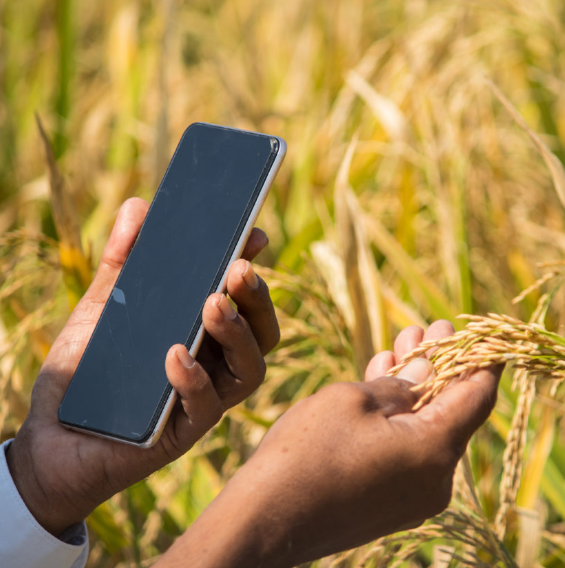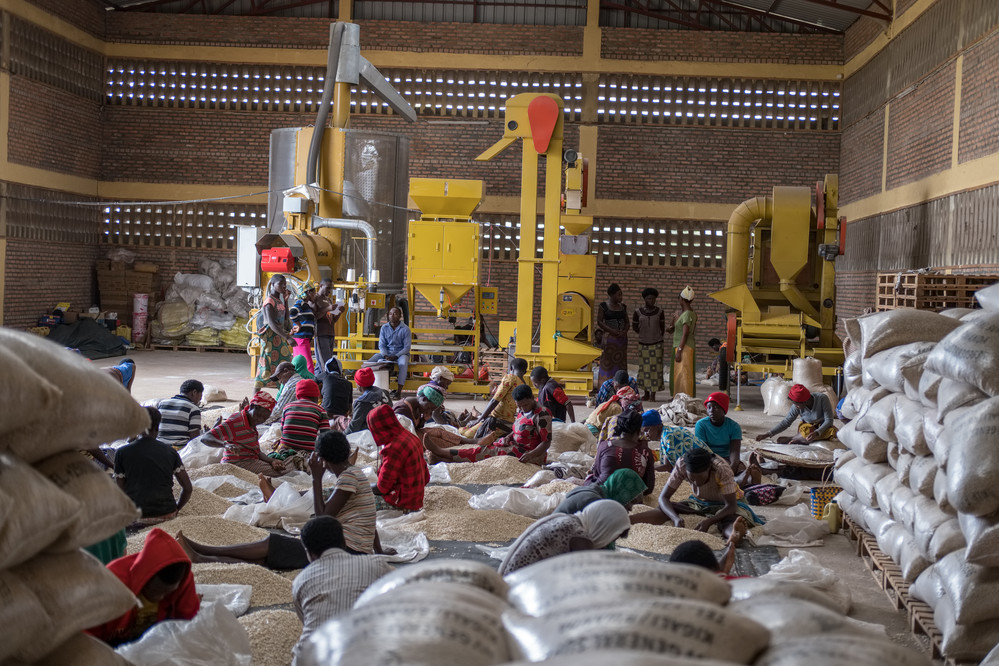Written by Ambrosio Nsingui Barros and Lucia Rakotovololona of IFAD

©IFAD/Simona Siad
The COVID-19 pandemic continues to rage around the world, creating disruption wherever it goes. But while such disruption often comes in the form of devastating health and economic consequences, it can also offer opportunities to put forward innovative solutions – especially for those populations who are most in need, such as rural farmers.
In Zambia, the Rural Finance Expansion Programme (RUFEP), a joint initiative of IFAD and the Government of the Republic of Zambia’s Ministry of Finance, is doing just that. RUFEP’s overall objective is to increase access to and use of sustainable financial services by poor rural men, women and youth. Since its inception in 2014, nearly one million people have benefited, directly or indirectly, from the financial products and services developed by its implementing partners.
The COVID-19 pandemic has generated unforeseen challenges for RUFEP’s beneficiaries and partners. But thanks to innovative technologies, RUFEP is supporting the national response mechanism as it works to mitigate the threats of the pandemic.
The role of digital finance
RUFEP operates through a network of microfinance institutions and digital financial services (DFS) aggregators. These services offer digital platforms that allow users to deposit and withdraw money, receive and pay loans, track their spending, and more – effectively dealing in what has been called “electronic money.” They also function as messaging systems, alerting users to market opportunities and other information relevant to their businesses. Thanks to the vast reach of mobile networks across the world in recent years – with a network penetration rate of over 91 per cent in Zambia alone, for example – combined with innovations such as solar-powered kiosks, these digital services remain viable and accessible options even in remote and off-grid areas.
Opting for digital finance has several benefits, particularly for micro-, small and medium enterprises (MSMEs). Using an electronic wallet is safer and more secure than cash in remote rural areas. Users can receive, transfer and even save money conveniently, as DFS often eliminates the need to travel to withdraw or deposit cash. Women in savings groups, in particular, have testified to their newfound capacity to control their financial affairs thanks to DFS. Their savings remain safely tucked away in e-wallets that only they can access, and cutting down on travel has freed up time for them to spend on their businesses and livelihoods.
RUFEP is currently working with regulators to make DFS more affordable for users, and is also actively supporting the Zambian consumer protection commission that works to filter spam, educate DFS users on fraud and issue security alerts.
Reaching out to rural areas
In ordinary times, extending these services to new beneficiaries would have required a slow, gradual process to educate users on how to use these products and promote effective behaviour change. Now, however, the coronavirus pandemic is accelerating the adoption of DFS by rural, poor and other communities. Given all the advantages that electronic money can bring, it’s easy to see why.
Thanks to the way DFS is structured, financial services can be delivered almost seamlessly, and at low cost, even in a scenario in which physical interactions, travel and gatherings are restricted. These services also eliminate potential disease transmission risks by circumventing the need for close interpersonal contact and handling of cash money. Health authorities, the Central Bank, and other financial service providers have thus taken this opportunity to promote the use of electronic money, and so far, the population has responded well.
These and other institutions have also begun to make use of these financial services in some perhaps unexpected ways. For example, the country’s Ministry of Health has developed targeted messages to raise awareness about COVID-19 and how to prevent transmission, and has made these messages available through RUFEP’s cash outlets and solar kiosks, as well as via mobile network operator (MNO) agents. MNOs have also been widely mobilized to distribute information to beneficiaries about available alternatives, including digital solutions, for continuity of essential services. This has been particularly valuable for those RUFEP services that require in-person meetings, such as savings groups.
Supporting economic recovery
As Zambia begins to look to the future, RUFEP is committed to deepening its understanding of how COVID-19 will affect smallholder farmers and other low-income groups. To that end, RUFEP is funding an initiative called Financial Sector Deepening Zambia that will undertake a socio-economic analysis aimed at informing post-pandemic recovery policies. The central government has also developed a dedicated instrument, called the Targeted Medium-Term Refinancing Facility, to support the recovery and resilience of the financial sector. Implemented through the Bank of Zambia (BoZ) and with a total funding of ZMW 10 billion (US$0.55 billion), this facility will enable financial service partners to buffer the economic impacts of the pandemic on agribusinesses.
RUFEP also continues to support the Association of Microfinance Institutions of Zambia, which has successfully engaged national authorities and regulators on behalf of its members to ensure that the recovery facility remains accessible to small borrowers and MSMEs.
To date, BoZ has approved a total of ZMW 2.3 billion (US$127 million) in recovery facility funds, 60 per cent of which is allocated to microfinance institutions. In partnership with IFAD, RUFEP will also provide technical assistance to ensure that the financing available through the recovery facility will reach rural smallholders.
For RUFEP, this is just another part of its mandate. Despite the pandemic, RUFEP remains dedicated to helping its beneficiaries access the services they need, extending the frontiers of financial inclusion while delivering the country’s response to COVID-19 to the last mile.
The authors would like to acknowledge contributions and reviews from the RUFEP coordination office staff: Michael Mbulo, Cephas Moonga and Caiaphas Habasonda.
Learn more about IFAD’s work in Zambia.
This article was originally published by IFAD.

